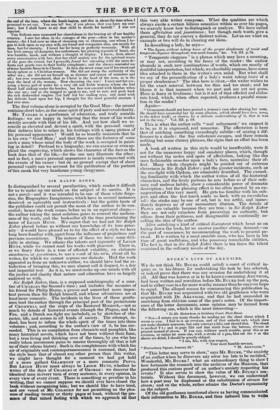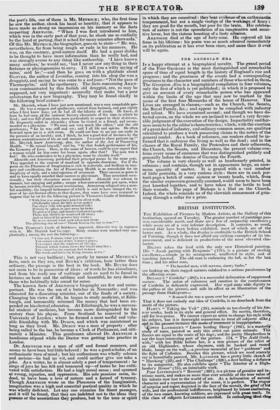BUCKE • S LIFE OF AKENSIDE.
WE do not think Mr. BUCKE could satisfy a court of critical in- quiry as to his fitness for undertaking the task he has selected, or indeed prove that there was any occasion for undertaking it at all. All that was known or is to be known concerning AKENSIDE, had been written and rewritten before Mr. BUCKE took up the pen, and in either case in a far more worthy manner than he can ever hope to equal. The alleged reason for commencing this publication is, that Mr. Bucice was acquainted with two old gentlemen who were acquainted with Dr. AKENSIDE, and that he had succeeded in snatching from oblivion some of the poet's notes. Of the import- ance of the latter documents, some opinion may be formed from the following one, which is the most interesting- " To Mr. Richardson, in Salisbury Court, Fleet Street.
f‘ Suu—I return you many thanks for sending me the sheet about which I wrote to you. I find in it an erratum, and of thatunlucky sort, which does not make absolute nonsense, but only conveys ?. false and absurd idea. The sheet is marked T t; and in page 328 and line ninth from the bottom, stream is printed instead of steam. If you can, without much trouble, print this as an erratum, or rather let some one' with a stroke of a pen, blot out the r as the sheets are dried, I should be greatly obliged. "I am, Sir, with true respect,
"Your most humble servant,
" Bloomsbury Square, January 25." "N. AKENS1DE."
"This letter may serve to show," says Mr. Meese, "the anxiety of an author when he discovers any error too late to be rectified." Wonderful, Mr. Bnexm ! what an extraordinary thing to show; how fortunate the research into the archives of the Museum, that produced this curious proof of an author's anxiety respecting his errata! It also serves to show the value of Mr. BUCKE'S ma- terials. Without this document, however, we can understand how a poet may be displeased at the substitution of stream for steam; and on the whole, rather admire the Doctor's equanimity, on the subject. Of the old gentlemen mentioned above as having communicated their information to Mr. Rucra, and thus induced him to writs the poet's life, one of them is Mr. MEYRICK ; who, the first time he saw the author, shook his hand so heartily, that it appears to have made as strong an impression on. his memory as the facts respecting AKENSIDE. "When I was first introduced to him, which was in the early part of that year, he shook me so cordially by the hand at parting, that it ached for many minutes afterwards. Of this Mr. MEYRICK, the biographer, goes on to state—" He was, nevertheless, far from being rough or rude in his manners. He was, on the contrary, good-nature itself. He had a great dislike to be thought to have more information than he really had, and was strongly averse to any thing like authorship. I have known many authors,' he would say, but I never saw any thing in their fortunes or physiognomies to envy. I'll tell you a witty saying of mine,' said he ;"—and then he goes on with a platitude about GLOVER, the author of Leonidas, coming into his shop (he was a druggist), and saying he was come to a sad pass: "Not the pass of Thermopylaa," said the apothecary. The facts concerning AKEN- SIDE communicated by this foolish old druggist, are, as may be supposed, not very important: assuredly they make but a poor substratum for a new biography. They may be found chiefly in the following brief extract— Mr. Meyrick, whom I have just now mentioned, was a very remarkable per- son. He was a surgeon and apothecary, retired from business, and past eighty when I first knew him; yet he bad all the hilarity of youth. Hi knew' at least he had seen, all the eminent literary characters of the time in which he lived ; and was full of anecdote, more particularly in respect to their distresses. He frequently called in Akenside ; whom he visited as a friend, and recom- mended as a physician. "We were not very much like either," said the old gentleman; for he was stiff and set ; and I all life and spirits. He often frowned upon me in a sick room. He could not bear to see any one smile in the presence of an invalid ; and, I think, he lost a good deal of business by the solemn sententiousness of his air and manner. I wanted to cheer patients up !" Mr. Meyrick knew Armstrong, also, the author of the Art of Preserving Health. "He ruined himself," said he, "by that foolish performance of his, the Economy of Love. How, in the name of heaven, could he ever expect that a woman would let him enter her house again, after that? The man was a fool ! He who undertakes to be a physician, must be chastity itself." Aken.side and Armstrong published their principal poems in the same year. They appealed to the consent of mankind in opposite directions. For if the poem on the Pleasures of Imagination is rich in materials, and brilliant in iina- gery and versification, the Art of Preserving Health is as remarkable for its simplicity of style, and a total rejection of ornament. Their success as poets is said to have equally retarded their success as physicians. They associated occa- sionally; but their characters never assimilated. Akenside was solemn in manner, but engaging and polite ; except when unwarrantably put upon, when he became irritable, though never overbearing. Armstrong relapsed into a mor- bid sensibility, the languid listlessness of which is said tolave damped the vi- gour of his intellectual efforts to that degree, that some have even ventured to suppose that he sat for the following picture in Thomson's Castle of Indolence.
" With him was sometimes join'd in silent walk. (Profoundly silent, for they never spoke)
One shyer still, who quite detested talk ;
If stung by spleen, at once away he.broke
To groves or pine, and broad o'crshadowiag oak:
There. inly thrilfd, he wandered all alone, And on himself his pensive fury wroke ; Ire never uttered word, save when first ihone
The glittering star of eve—' Thank heaven the day is done? "
When Thomson's Castle of Indolence appeared, Akenside was in raptures with it. Mr. Meyrick had his copy. Many stanzas were marked very em- phatically; among the rest the following— "1 care not, Fortune, what you me deny: You cannot rob me of free Nature's grace; Yea cannot shut the windows of the sky, Through which Aurora shows her brighl'ning face ;
You ea ;mot liar my constant feet to trace
The woods and lawns by living streams at eve."
This is not very brilliant ; but, partly by means of' MEx-iiicies facts, such as they are, and Bucite's criticism, here better than ordinary, the passage is the best in the book. Mr. BUCKE does not seem to be in possession of ideas : of words he has abundance, and from his ready use of verbiage such as used to be found in lectures on taste and the sublime and beautiful, he may deceive those who habitually take sound for sense.
The known facts of AKENSIDE'S biography are few and unim- portant. He was the son of a butcher in Newcastle' and was educated for a dissenting minister, out of the funds of a society. Changing his views of life, he began to study medicine, at Edin- burgh, and honourably returned the money that had been ex- pended on his clerical education. At Edinburgh, he was a success- ful "student of medicine, but became more distinguished for his oratory than his physic. From Scotland he removed to the T.Iniversity of Leyden where he formed a most useful and valu- able friendship with Mr. DirsoN, and which was maintained as long as they lived. Mr. Eh-sox was a man of property : after being called to the bar, he became a Clerk of Parliament, and ulti- mately a Minister. This gentleman allowed Dr. AKENSIDE a handsome stipend while the Doctor was getting into practice in London.
Dr. AKENSIDE was a man of stiff and formal manners, and seems to have been but little beloved : he was a good scholar, of an enthusiastic turn of mind ; but his enthusiasm was wholly solemn and serious—he had no wit, and could neither give nor take a joke. As a writer, he is almost solely a poet of temperament : he sings ofjoys he has felt and treasured up—of tastes he has culti- vated with satisfaction. He had a high moral sense ; and spurned at wrong, injustice, and oppression. His sole passions seem, in- deed, to have been a love of nature and a hatred of tyranny. Though AKENSIDE wrote on the Pleasures of the Imagination, imagination was a high and essential poetical quality in which he was wholly deficient. Let any one examine his finest passages, and it will be found, that they are indebted not to the ideas they possess or the associations they produce, but to the tone or spirit in which they are conceived : they hear evacuee of' an enthusiastin, temperament, but not a single vestige of the workings of fancy : they are good for the mouth, but poor for the brain. His celebra), tion of nature is not the speeulation of an imaginative and sensi- tive lover, but the riotous boasting of a lusty admirer.
AKENSIDE died at the age of forty-nine. He enjoyed all his' fame in his lifetime: his poem was as much admired immediately on its publication as it has ever been since, and more than it ever will be again.



























 Previous page
Previous page